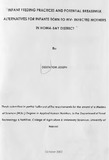| dc.description.abstract | Huge amount of work has been done on HIV/AIDS including on MTCT, but there still
remains a dearth of information in areas related to appropriate feeding for infants of
mothers infected with HIV. Some suggested infant feeding methods in theory have lots of
merit but not much has been done to determine their practical feasibility especially in
African rural settings.
This study was therefore designed to assess the infant feeding practices and viable
breastmilk alternatives for infants born to HIV positive mothers and the sociocultural,
health, technological and economic conditions surrounding the choice of such practices in
a rural community in South Western Kenya. The study carried out in Nyarongi and Riana
Divisions in Homa-Bay district during the period of September - December 2000 had three
objectives namely: to determine, 1) maternal knowledge on MTCT of HIV in the
community, 2) the prevailing infant feeding practices in the community and among the HIV
positive mothers; and 3) the factors affecting mothers' decision on the various feeding
alternatives.
The study involved the administration of semi-structured questionnaires to one hundred
and twelve mothers with infants in addition to Focus Group Discussions, key informant
interviews, case studies and observations among a sample of eleven sero-positive
mothers.
The maternal knowledge on MTCT of HIV was very low in the study area, standing at
about 8.9%. The MTCT knowledge was found to influence the alternative feeding choice
as mentioned by the non-tested mothers (p=0.001, OR=1.41; 95%CI, 1.04- 3.86). Those
with high MTCT knowledge tended to be more receptive and considered feeding
alternatives other than cowmilk like expressed breastmilk, formula (p=0.036; OR=2.44;
95%CI, 1.66- 6.04) and milk from milk bank (p=0.015; OR=1.34; 95%CI, 1.13- 5.50) than
their counterparts with low MTCT knowledge. The predominant feeding practice
traditionally and presently was mixed feeding with virtually none of the babies below 4
months of age exclusively breastfed. The practice of giving prelacteals (mainly plain water
and/or herbal drinks) is common. Complementary foods, mainly cowmilk and/or uji are
introduced early at a median age of 2-3 months because of perceived insufficient
breastmilk or the mother being away from the baby. Breastfeeding is, however, a
universal practice with 98.2% having breastfed their babies. Most mothers introduce
breastmilk in the first 24 hours of delivery, breastfeed on demand and continue
breastfeeding to the second year with median breastfeeding duration of 23 months.
The choice of feeding alternative is influenced by a number of factors among them, cultural
attitudes, information/instruction received from the health facility, ability to afford the feed
and knowledge on MTCT. Wet-nursing is practicable in the community especially by the
more elderly women, but has cultural constraints. Infant formula is acceptable among the
HIV positive mothers, but is too expensive for them to afford and cowmilk is the most
common, acceptable and accessible, even though there is poor knowledge on its
modification/dilution. Other suggested feeding alternatives like goatmilk, expressed and
heat-treated breastmilk, breastmilk from milk bank and dry powder milk are generally
unacceptable in this community.
The study recommends that Health/Nutrition education targeted at the sero-positive
mothers, but also for the general population; improved community-based medical and
family planning services; improved supply of cowmilk in the community; digging of
boreholes and latrines for better sanitation among other interventions can help reduce
MTCT rate in this area. | en |

